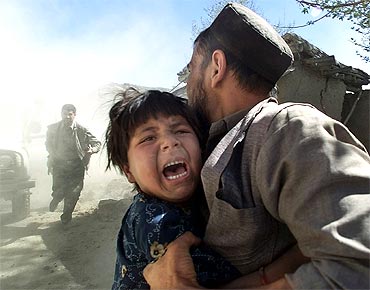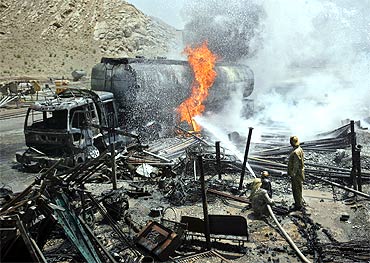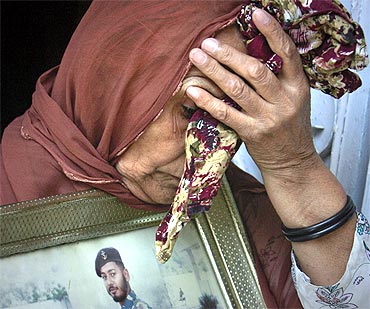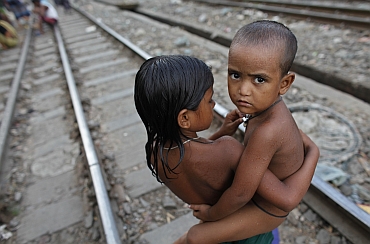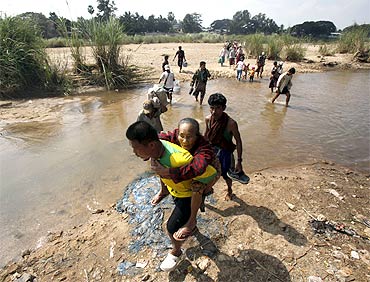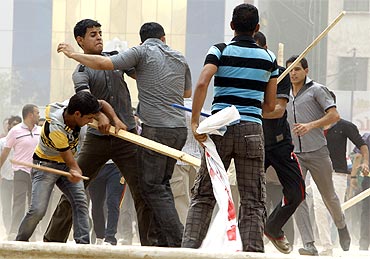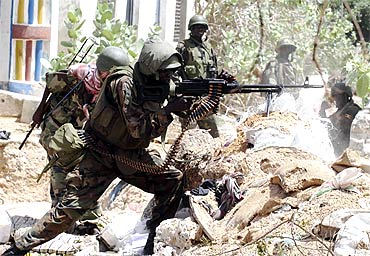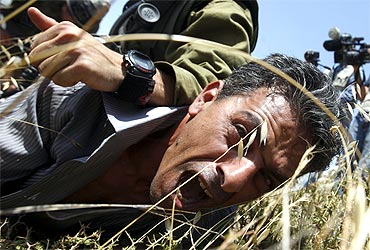This article was first published 14 years ago
Home »
News » In PHOTOS: Horror tales from India's 'failed' neighbourhood
In PHOTOS: Horror tales from India's 'failed' neighbourhood
Last updated on: June 21, 2011 13:00 IST
Image: An Afghan girl screams as she is held her father as a sharp aftershock hits the country
Photographs: Jim Hollander/Reuters
India's neighbours -- Pakistan, Bangladesh, Nepal and Sri Lanka -- are featured in the list of the "most failed states", according to the annual ranking prepared by the Foreign Policy magazine.
Afghanistan is at number 7 and Pakistan at number 12. Myanmar appears 18th on the list of failed states, Bangladesh (25); Nepal (27), Sri Lanka (29) and Bhutan is at 50 in a list of 60 countries dominated by African nations.
...
Image: Firefighters hose down an oil tanker which was set ablaze by gunmen in Quetta June 19, 2011. Gunmen torched the truck carrying fuel for NATO forces in Afghanistan in southwestern Baluchistan province
Photographs: Naseer Ahmed/Reuters
Rank: 7 Among India's neighbours, on top of the list of failed states is Afghanistan. Overshadowed by the debate over North Atlantic Treaty Organisations's military operations, the stories of a resurgent Taliban, and the West's perpetual consternation with local corruption, a humanitarian nightmare is unfolding in Afghanistan.
Violence has been "metastasising" throughout the country, in the words of
FP contributor Anna Badkhen. Assaults and abuse of women have reached tragic proportions, despite US promises a decade ago to liberate the country's other half. Child mortality rates are almost three times as high as they are in the rest of South Asia, the report said.
Image: Irshad Bibi grieves with a picture of her son, former navy commando Kamran Ahmed, who was detained in connection with the Mehran attack
Photographs: Mani Rana/Reuters
Rank: 12
On Pakistan, the report said, "Pakistan has long been dubbed the world's most dangerous country in Washington policy circles" and "yet Pakistan isn't just dangerous for the West -- it's often a danger to its own people."
Pakistan isn't just dangerous for the West -- it's often a danger to its own people. It is Pakistanis who have paid the highest price for terrorist attacks in recent years. Thousands have died in attacks on Pakistani soil. Worse yet still, last summer's floods reportedly affected 14 million people; 650,000 houses were destroyed.
Image: Nafisa plays with her sister in a slum beside a railway line in Dhaka
Photographs: Andrew Biraj/Reuters
Rank: 25
On Bangladesh, the report said, two of five Bangladeshis live under the poverty line. Any improvements will also be fighting the environmental clock. If sea levels rise just by 1 metre, scientists warn, 17 per cent of the country could be submerged.
Despite the frequent shocks, Bangladesh's macroeconomy still looks strong, and the government promised in May that it would see the best growth in decades, the report said.
Image: Nepalese police and protesters allied with Rastriya Prajatantra Party Nepal clash
Photographs: Navesh Chitrakar/Reuters
Rank: 27
"Nepal is the poorest country in South Asia, according to the United Nations, and that's unlikely to change until the peace process is implemented and security restored. There are signs that the Maoists may be losing patience -- and thinking about going back to the trenches to fight for more," the report said.
Image: A student shouts slogans outside President Mahinda Rajapaksa's house
Photographs: Dinuka Liyanawatte/Reuters
Rank: 29
This May, Sri Lanka celebrated its second year of peace after 26 years of civil war with a separatist army in the north and east, the so-called Tamil Tigers. It was a conflict marked by brutality from start to end.
On Sri Lanka, the report said, "The government's final push against the rebels relied on the shelling of civilians and other atrocities, according to a 2010 report by the International Crisis Group The most recent statistics from last year indicate that some 3,27,000 are still displaced from the conflict."
"Despite the pronounced fractures still lingering, the Sinhalese-dominated government in Colombo seems eager to forget the past," it added.
Image: Myanmar refugees crossed over from to Thailand after battle erupted between soldiers and rebels
Photographs: Chaiwat Subprasom/Reuters
Rank 18
Despite the installation of a new head of state, Myanmar's ruling military junta remains in power; the democratic opposition thwarted by procedural rules. As the US State Department tactfully put it, "The generals who have ruled the country for the past 22 years missed an opportunity to begin genuine transition toward democratic governance and national reconciliation."
The ground-level result is more of the same: Opposition activists claim that 90 per cent of the population lives in poverty and that the government spends as much as half of its revenue on bolstering the military. Regional uprisings against the junta's rule are often brutally quashed. In December 2010, 20,000 people, fled to Thailand when rebels clashed with the government in the Thai border town of Mae Sot, the Foreign Policy reported.
Image: upporters of Iraq's Prime Minister Nuri al-Maliki clash with anti-government protesters
Photographs: Saad Shalash/Reuters
Rank: 9
On the failed state index Iraq is ranked ninth. After eight years at the forefront of US attention, Iraq today is, if anything, America's forgotten war. The violence has calmed from its peak in 2007, but security is far from assured in many pockets of the country. And behind the hard stats on the number of bombings or insurgent attacks, this country is still reeling from decades of sanctions and conflict.
On any number of indicators -- from educational enrollment to child mortality rates -- Iraq today looks worse than it did just a few years ago. Among Iraq's hidden tragedies are the more than 3 million people who fled their homes during the worst of the fighting and still haven't gone home, the report said.
Photographs: Desmond Boylan/Reuters
Rank: 50
The beautiful mountain kingdom of Bhutan is, in a word, isolated.the markers of modern development are also absent. Bhutan's proportion of rural residents is about twice as much as the world average, the report said.
Image: African Union Peacekeepers take up a defensive position as they battle insurgents in Mogadishu
Photographs: Reuters
Rank: 1
Ranked first on the 2011 Failed States Index is Somalia. Out of a population of nearly 10 million, as many as 3 million are thought to need humanitarian assistance. Another 2 million have been uprooted in the conflict, and political infighting has paralyzed the nascent government.
Perhaps the greatest fear looming over Somalia today is that it will become the next haven for the Al Qaeda fleeing Afghanistan, the report said.
Image: A protester shouts as Israeli border police officers detain him during clashes
Photographs: Reuters
Rank: 53
Israel may boast one of the world's most dynamic, high-tech economies, but in June 2010, Save the Children, a British-based charity, released alarming figures describing the humanitarian situation in the occupied West Bank. For example, nearly half the children growing up in Area C, the portion under full Israeli control, suffered from water-borne diarrhoea, a major contributor to malnutrition.
Other countries in the top 10 are Chad, Sudan, Democratic Republic of Congo, Haiti, Zimbabwe, Afghanistan Central African Republic and Iraq.
Source:
PTI© Copyright 2025 PTI. All rights reserved. Republication or redistribution of PTI content, including by framing or similar means, is expressly prohibited without the prior written consent.
